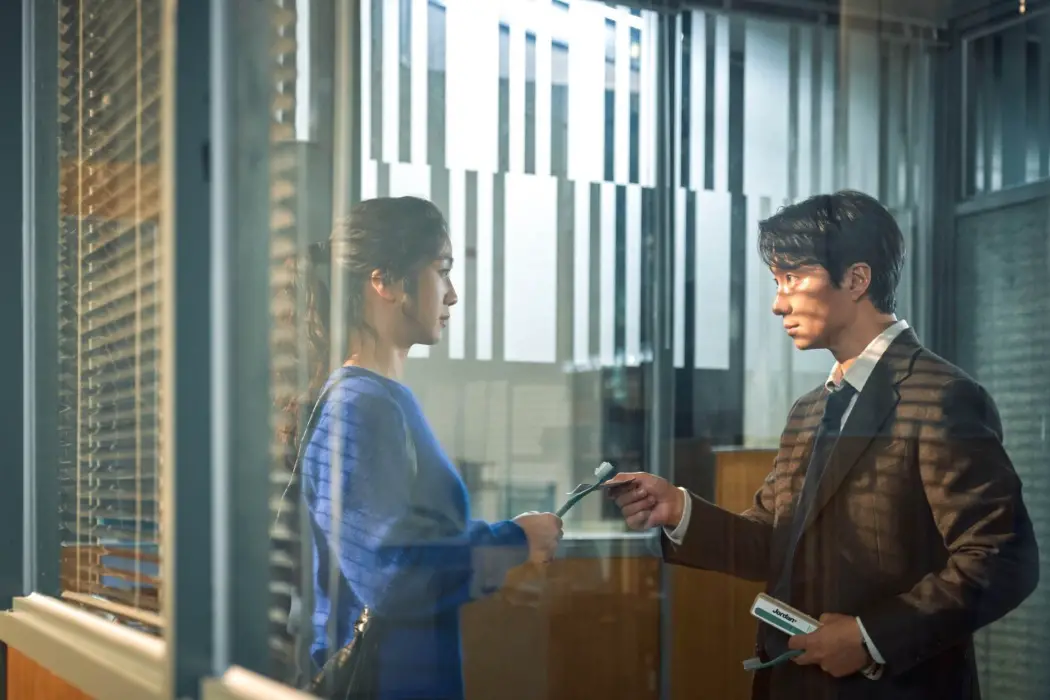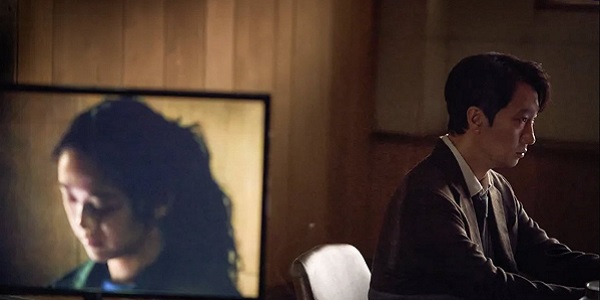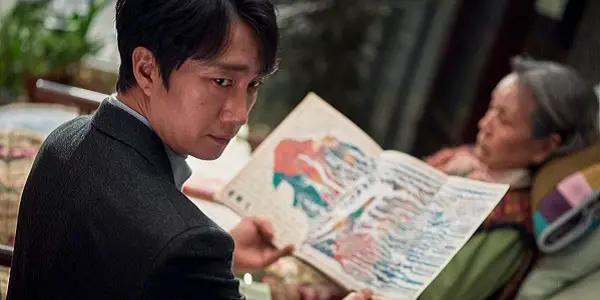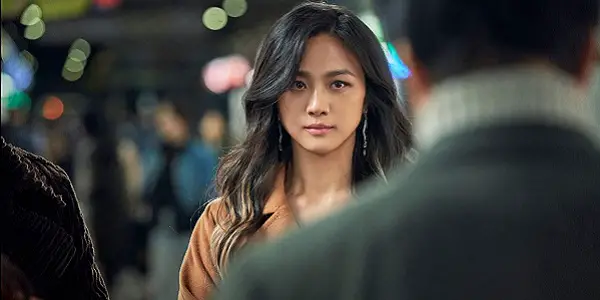DECISION TO LEAVE: Caught In A Bad Romance

Lee Jutton has directed short films starring a killer toaster,…
Six years after audiences were enraptured by the sumptuous suspense of The Handmaiden, director Park Chan-wook is back. His new film, Decision to Leave, chronicles the relationship that unfolds between a dogged police detective and a mysterious woman suspected of murdering her husband. But this seemingly simple logline belies the complex array of emotions elicited by the film.
Suspicion
Detective Hae-jun (Park Hae-il) divides his life between his job in Busan and his wife in the foggy coastal town of Ipo. He’s constantly on the move and rarely sleeps, choosing late-night stakeouts over trying and failing to get any shut-eye. One day, while investigating the death of a rock climber who fell from a cliff, he meets the dead man’s enigmatic wife, Seo-rae (Tang Wei). Her husband was a much older Korean immigration official; she is a young and beautiful Chinese national who stifles a laugh during her police interview with hands that bear suspicious scratches. So, Hae-jun places her under surveillance, watching her work as a caregiver to the elderly during the day and fall asleep after eating ice cream for dinner at night.

Soon, the line between suspect and detective becomes dangerously blurred, with Seo-rae showing up at Hae-jun’s home to assist him with unsolved cases and help him fall asleep. That nothing explicitly sexual happens between the two of them makes their growing bond feel all the more intense. The two of them might be on opposite sides of the case, but in many ways, they are all too alike. And no matter how much evidence might point in Seo-rae’s direction, Hae-jun cannot bring himself to believe she could have murdered her husband.
Spellbound
The first half of Decision to Leave is a relatively straightforward neo-noir thriller; after all, it’s not like we haven’t seen previously upstanding cops fall hard for femmes fatales many times before. But that doesn’t mean watching it all unfold isn’t absolutely fascinating. Director Park allows Hae-jun to magically enter Seo-rae’s apartment while surveilling her from the outside, moving through the rooms as a visual representation of the boundaries being crossed by this investigation. It’s hard to think of a gesture more painfully intimate than Hae-jun holding out a tray to catch the ash drifting from Seo-rae’s hand while knowing that he’s actually on the outside looking in, imagining himself performing these acts from the confines of his car. It’s when he crosses that line in the real world that we know Hae-jun has truly fallen under Seo-rae’s spell; their fates are now too intertwined for them to go on living their lives the way they did before.

In the film’s second half, Hae-jun finds himself involved in another murder investigation, and Decision to Leave begins taking much more unexpected twists and turns; it is here that the film evolves from entertaining Hitchockian throwback into something truly special. Park continues to play with time and space, flashing back to key moments as Hae-jun reexamines them from different angles and startling new information surfaces. In the hands of less skilled cinematic storytellers, perhaps this could be confusing, but in the hands of director Park, co-writer Jeong Seo-kyeong, and editor Kim Sang-beon — recurring collaborators all — it is enlightening.
Such an intoxicating, all-consuming love story as the one in Decision to Leave — the kind that cannot help but destroy multiple lives — could not succeed without dynamite chemistry between the leads. Fortunately, Park Hae-il and Tang Wei have it; their scenes spark with flinty humor and irresistible attraction. Even the language barrier cannot keep them apart; when Seo-rae deems her Korean “insufficient” for expressing what she really means, she speaks furiously into her phone while using a translator app, and somehow her words lose none of their potency even when repeated in an electronic male monotone. Laced with the dark, almost venomous wit that one has come to associate with Park Chan-wook, the dialogue snaps and crackles—and occasionally stabs you in the heart.

The film looks gorgeous, and not just because the two leads are incredibly attractive (though that certainly helps). From the twinkling city lights of Busan to the country’s craggy coastline, cinematographer Kim Yi-jong captures it all with a rich atmosphere of mystery and romance. When Hae-jun staggers between the fog-drenched rocks on the beach while on a desperate search, it feels positively primeval, as though Hae-jun has somehow gone back in time to the beginning of the world — and after all, is there any more timeless tale to tell than that of a man risking it all for a woman?
Conclusion
An impeccably crafted puzzle box of a film, Decision to Leave cements Park Chan-wook’s place in cinema as our modern master of suspense.
What do you think? What are your favorite Park Chan-wook movies? Share your thoughts in the comments below.
Decision to Leave opened in the U.S. on October 14 and in the UK on October 21, 2022. You can find more international release dates here.
Watch Decision to Leave
Does content like this matter to you?
Become a Member and support film journalism. Unlock access to all of Film Inquiry`s great articles. Join a community of like-minded readers who are passionate about cinema - get access to our private members Network, give back to independent filmmakers, and more.
Lee Jutton has directed short films starring a killer toaster, a killer Christmas tree, and a not-killer leopard. Her writing has appeared in publications such as Film School Rejects, Bitch: A Feminist Response to Pop Culture, Bitch Flicks, TV Fanatic, and Just Press Play. When not watching, making, or writing about films, she can usually be found on Twitter obsessing over soccer, BTS, and her cat.













